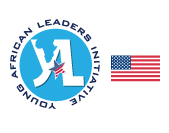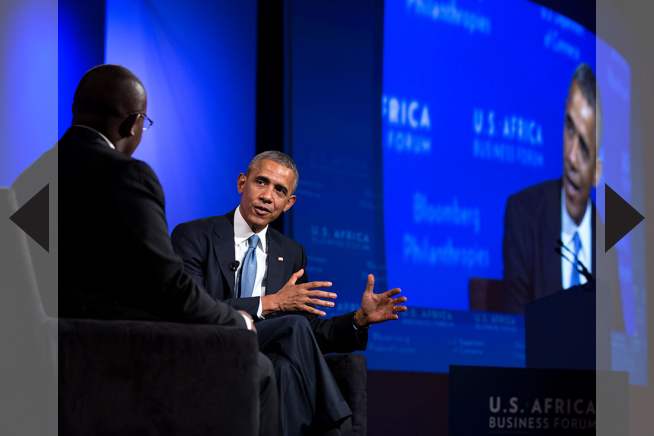August 4-6
“I do not see the countries and peoples of Africa as a world apart; I see Africa as a fundamental part of our interconnected world – partners with America on behalf of the future we want for all of our children. That partnership must be grounded in mutual responsibility and mutual respect.”
President Obama
President Obama welcomed leaders from across the African continent to the nation’s capital for a three-day U.S.-Africa Leaders Summit, the first such event of its kind. The Summit, the largest event any U.S. President has held with African heads of state and government, built on the President’s trip to Africa in the summer of 2013 and aimed to strengthen ties between the United States and one of the world’s most dynamic and fastest-growing regions. Specifically, the August 4-6 Summit advanced the Administration’s focus on trade and investment in Africa and highlighted America’s commitment to Africa’s security, its democratic development, and its people. At the same time, it highlighted the depth and breadth of the United States’ commitment to the African continent, advanced our shared priorities, and enabled discussion of concrete ideas to deepen the partnership. At its core, the Summit was about fostering stronger ties between the United States and Africa.
The theme of the Summit was "Investing in the Next Generation." Focusing on the next generation is at the core of a government’s responsibility and work, and this Summit provided an opportunity to discuss ways of stimulating growth, unlocking opportunities, and creating an enabling environment for the next generation.
Summit Materials
Photogalleries
View the U.S.-Africa Leaders Summit Photogallery
Fact Sheets
- U.S. Cooperation Advancing Gender Equality
- U.S.-African Cooperation in Global Health
- Shared Investment in Youth
- U.S.-African Cooperation in Food Security
- U.S. Engagement in Climate Change and Resilience in Africa
- Investing in African Trade for our Common Future
- U.S. Support for Democratic Institutions, Good Governance, and Human Rights in Africa
- U.S. Support for Combating Wildlife Trafficking
- The Doing Business in Africa Campaign
- Powering Africa: Increasing Access to Power in Sub-Saharan Africa
- Investments Announced at Symposium for African Spouses Hosted by First Lady Michelle Obama and Former First Lady Laura Bush
- U.S. Support for Peacekeeping in Africa
- Security Governance Initiative
- Partnering to Counter Terrorism in Africa
Other Statements
Program of Events
Throughout the U.S.-Africa Leaders Summit, African leaders had the opportunity to engage with President Obama, his Cabinet members, and other key leaders, including business executives from the U.S. and Africa, Members of Congress, and members of civil society.
Discussions centered on how to encourage progress in key areas that Africans define as critical for the future of the continent: expanding trade and investment ties, engaging young African leaders, promoting inclusive sustainable development, expanding cooperation on peace and security, and gaining a better future for Africa’s next generation.
President Obama invited all African heads of state or government in good standing with the United States and the African Union to attend the U.S.-Africa Leaders Summit. An invitation was also extended to the African Union Chairperson.
We were pleased to welcome the following participating countries, whose Heads of Delegation are listed below:
Read the background Papers for each participating country.
- Algeria: Delegation headed by Prime Minister Abdelmalek Sellal
- Angola: Delegation headed by Vice President Manuel Domingos Vicente
- Benin: Delegation headed by President Boni Yayi
- Botswana: Delegation headed by Foreign Minister PhAndu Tombola Chanda Skelemani
- Burkina Faso: Delegation headed by President Blaise Compaore
- Burundi: Delegation headed by President Pierre Nkurunziza
- Cabo Verde: Delegation headed by President Jorge Carlos de Almeida Fonseca
- Cameroon: Delegation headed by President Paul Biya
- Chad: Delegation headed by President Idriss Deby Itno
- Comoros: Delegation headed by President Ikililou Dhoinine
- Cote d’Ivoire: Delegation headed by Prime Minister Daniel Kablan Duncan
- Democratic Republic of the Congo: Delegation headed by President Joseph Kabila Kabange
- Djibouti: Delegation headed by President Ismail Omar Guelleh
- Egypt: Delegation headed by Prime Minister Ibrahim Mahlab
- Equatorial Guinea: Delegation headed by President Teodoro Obiang Nguema Mbasogo
- Ethiopia: Delegation headed by Prime Minister Hailemariam Desalegn Boshe
- Gabon: Delegation headed by President Ali Bongo Ondimba
- Ghana: Delegation headed by President John Dramani Mahama
- Guinea: Delegation headed by President Alpha Condé
- Guinea Bissau: Delegation headed by President Jose Mario Vaz
- Kenya: Delegation headed by President Uhuru Kenyatta
- Lesotho: Delegation headed by Prime Minister Motsoahae Thomas Thabane
- Liberia: Delegation headed by Vice President Joseph Nyuma Boakai, Sr.
- Libya: Delegation headed by Prime Minister Abdalla Alteni
- Madagascar: Delegation headed by President Hery Rajaonarimampianina
- Malawi: Delegation headed by President Arthur Peter Mutharika
- Mali: Delegation headed by President Ibrahim Boubacar Keita
- Mauritania: Delegation headed by President Mohamed Ould Abdel Aziz
- Mauritius: Delegation headed by Prime Minister Navinchandra Ramgoolam
- Morocco: Delegation headed by Prime Minister Abdel-Ilah Benkiran
- Mozambique: Delegation headed by President Armando Emílio Guebuza
- Namibia: Delegation headed by President Hifikepunye Lucas Pohamba
- Niger: Delegation headed by President Issoufou Mahamadou
- Nigeria: Delegation headed by President Goodluck Ebele Jonathan
- Republic of the Congo: Delegation headed by President Denis Sassou-Nguesso
- Rwanda: Delegation headed by President Paul Kagame
- São Tomé and Príncipe: Delegation headed by Prime Minister Gabriel Arcanjo Ferreira da Costa
- Senegal: Delegation headed by President Macky Sall
- Seychelles: Delegation headed by President James Alix Michel
- Sierra Leone: Delegation headed by Foreign Minister Samura Kamara
- Somalia: Delegation headed by President Hassan Sheikh Mohamud
- South Africa: Delegation headed by President Jacob Gedleyihlekisa Zuma
- South Sudan: Delegation headed by President Salva Kiir Mayardit
- Swaziland: Delegation headed by King Mswati III
- Tanzania: Delegation headed by President Jakaya Mrisho Kikwete
- The Gambia: Delegation headed by President Alhaji Dr. Yahya A.J.J. Jammeh
- Togo: Delegation headed by President Faure Essozimna Gnassingbé
- Tunisia: Delegation headed by President Mohamed Moncef Marzouki
- Uganda: Delegation headed by President Yoweri Kaguta Museveni
- Zambia: Delegation headed by Vice President Guy Scott
Description of Events
AUGUST 1
Signature Events
The Summit included six U.S. Government-sponsored “Signature Events,” allowing for in-depth conversations on some of the most pressing issues facing the U.S.-Africa partnership. These sessions set the stage for the high-level discussions that President Obama chaired during the subsequent Summit leader meetings.
AUGUST 4
Signature Events
On August 4, the Summit held the following Signature Events:
Read the key recommendations from civil society for the U.S.-Africa Leaders Summit
Vice President Joe Biden speaks at the U.S.-Africa Leaders Summit Civil Society Forum:
Dr. Jill Biden speaks during a luncheon at the U.S.-Africa Leaders Summit:
This discussion highlighted the decades-long U.S.-African health partnership that has saved and improved millions of lives. It also provided an opportunity for U.S. and African leaders to agree on how we can further advance our shared health and development goals through our strong partnerships.
Dr. Jill Biden delivers remarks at the U.S.-Africa Leaders Summit on resilience and food security in a changing climate:
Wildlife trafficking is a multi-billion dollar criminal enterprise that is a critical conservation concern and global security threat. This past February, President Obama approved a new National Strategy for Combating Wildlife Trafficking that underscores the United States' commitment to help stem this illegal trade that is decimating species and undermining security across nations. Event participants included members of African delegations, YALI fellows, officials from United States Government Task Force agencies and departments, NGOs, and the U.S. Congress.
AGOA Forum
To further demonstrate our commitment to the sustainable economic growth and development in Africa U.S. Trade Representative Michael Froman hosted the African Growth and Opportunity Act (AGOA) Ministerial at the World Bank. African and U.S. trade officials discussed the future of the AGOA program and U.S. plans to pursue renewal of AGOA legislation.
Capitol Hill Reception
The Senate Foreign Relations and House Foreign Affairs Committees hosted a welcome reception for African leaders on Capitol Hill in the afternoon.

AUGUST 5
U.S.-Africa Business Forum
On August 5, the U.S. Department of Commerce and Bloomberg Philanthropies co-hosted the first U.S.-Africa Business Forum, a day focused on strengthening trade and financial ties between the United States and Africa. President Obama participated in the Business Forum along with Secretary Pritzker and Mayor Bloomberg, as well as other senior U.S. government officials. Held at the Mandarin Oriental in Washington, D.C., the U.S.-Africa Business Forum aimed to intensify efforts to strengthen trade and financial ties between the United States and Africa, and to create partnerships that will promote trade, accelerate job growth, and encourage investment. The Forum focused on U.S. private-sector engagement in Africa in the areas of finance and capital investment; infrastructure; power and energy; agriculture; consumer goods; and information and communication technology. African leaders engaged with business executives from both sides of the Atlantic in conversations about successes and solutions to increase trade with and invest in Africa. President Obama also participated in the conversation with CEOs and government leaders from the United States and Africa.
President Obama Delivers Remarks
The Vice President Delivers Remarks to the U.S.-Africa Leaders Summit Business Forum
See the U.S.-Africa Business Forum official website
See the lists of Business Forum attendees:
White House Dinner on the occasion of the U.S.-Africa Leaders Summit
On the evening of August 5, President and Mrs. Obama hosted a dinner at the White House for African heads of state and government and select guests.
See more details about the dinner, and take a look at the leaders' photos with the President and the First Lady.
President Obama Speaks at the U.S.-Africa Leaders Summit Dinner

AUGUST 6
Summit Leader Meetings
African leaders and President Obama engaged in dialogue in three action-oriented sessions that addressed issues of shared interest and mutual concern.
Leader Session I - Investing in Africa’s Future
The opening session discussed inclusive, sustainable development, economic growth, and trade and investment.
President Obama Participates in the Session
Leader Session II - Peace and Regional Stability
A working lunch centered around shared concerns regarding peace and security, including a discussion of long-term solutions to regional conflicts, peacekeeping challenges, and combating transnational threats.
Leader Session III - Governing for the Next Generation
This session allowed for a candid conversation about the greatest challenges and opportunities for Africa’s continued political and economic progress and a specific focus on governance. The session focused on how to enhance governance in order to deliver services to citizens, attract and prepare for increased domestic and foreign direct investment, manage transnational threats, and stem the flow of illicit finance.
Leader Press Conferences
President Obama Holds a Press Conference
![]()
Spousal Program
First Lady Michelle Obama, in partnership with former First Lady Laura Bush and the Bush Institute, hosted a day-long spouses symposium at the Kennedy Center focused on the impact of investments in education, health, and public-private partnerships.
A Conversation with The First Lady and Mrs. Laura Bush
Dr. Jill Biden Speaks on Creating Opportunities for Young Women Leaders
A Dialogue with African CEOs
Congressman Gregory W. Meeks and the Congressional Black Caucus Africa Task Force hosted “A Dialogue with African CEOs,” entailing panel discussions and networking with African business and political leaders, U.S. private-sector representatives, and members of Congress.
Media
Any media-related questions should be directed to the U.S. Media Coordinator’s Office, at AfricaSummitMedia@state.gov.
Side Events
In order to leverage the presence in Washington, D.C. of so many African leaders as well as the intense interest in U.S.-Africa ties that the Summit has engendered, a number of non-government actors — the private sector and non-profit organizations — organized events along the margins to coincide with the U.S.-Africa Leaders Summit.
National Statements
The historic U.S.-Africa Leaders Summit was an action-oriented, dynamic opportunity to discuss issues of concern to our African partners and the United States. Below are the national statements produced in advance by participating countries to allow maximum time for open discussion and exchange of ideas during the Summit events.
YALI
 President Obama launched the Young African Leaders Initiative (YALI) in 2010 to support young leaders with opportunities and resources. Through YALI, the United States is committing significant resources to enhance leadership skills, bolster entrepreneurship, and connect young African leaders with one another, with the United States, and with the American people. Investing in the next generation of African leaders is critical to ensuring the success of Africa’s democracies and its economies.
President Obama launched the Young African Leaders Initiative (YALI) in 2010 to support young leaders with opportunities and resources. Through YALI, the United States is committing significant resources to enhance leadership skills, bolster entrepreneurship, and connect young African leaders with one another, with the United States, and with the American people. Investing in the next generation of African leaders is critical to ensuring the success of Africa’s democracies and its economies.
July 28, 2014
The President Holds a Town Hall with Young African Leaders
The Washington Fellowship for Young African Leaders is the exchange program of the President’s Young African Leaders Initiative (YALI). This program brings over 500 young leaders to the United States each year, beginning in 2014, for leadership training, academic coursework, and mentoring. It also creates unique opportunities in Africa, through internships and follow-on opportunities, to put those new skills to practical use in propelling economic growth and prosperity and strengthening democratic institutions. To be part of the YALI Network, follow @YALINetwork on Twitter or find us on Facebook.
For more information on YALI, please visit YoungAfricanLeaders.state.gov.
Learn more:
- FACT SHEET: The Mandela Washington Fellowship for Young African Leaders
- BACKGROUND & FACT SHEET: The President’s Young African Leaders Initiative (YALI)
- Remarks by the First Lady at the Summit of the Mandela Washington Fellowship for Young African Leaders
- Communiqué of the Mandela Washington Fellows
 President Obama welcomed leaders from across the African continent to the nation’s capital for a three-day U.S.-Africa Leaders Summit, the first such event of its kind. The Summit, the largest event any U.S. President has held with African heads of state and government, built on the President’s trip to Africa in the summer of 2013 and aimed to strengthen ties between the United States and one of the world’s most dynamic and fastest-growing regions. Specifically, the August 4-6 Summit advanced the Administration’s focus on trade and investment in Africa and highlighted America’s commitment to Africa’s security, its democratic development, and its people. At the same time, it highlighted the depth and breadth of the United States’ commitment to the African continent, advanced our shared priorities, and enabled discussion of concrete ideas to deepen the partnership. At its core, the Summit was about fostering stronger ties between the United States and Africa.
President Obama welcomed leaders from across the African continent to the nation’s capital for a three-day U.S.-Africa Leaders Summit, the first such event of its kind. The Summit, the largest event any U.S. President has held with African heads of state and government, built on the President’s trip to Africa in the summer of 2013 and aimed to strengthen ties between the United States and one of the world’s most dynamic and fastest-growing regions. Specifically, the August 4-6 Summit advanced the Administration’s focus on trade and investment in Africa and highlighted America’s commitment to Africa’s security, its democratic development, and its people. At the same time, it highlighted the depth and breadth of the United States’ commitment to the African continent, advanced our shared priorities, and enabled discussion of concrete ideas to deepen the partnership. At its core, the Summit was about fostering stronger ties between the United States and Africa.

